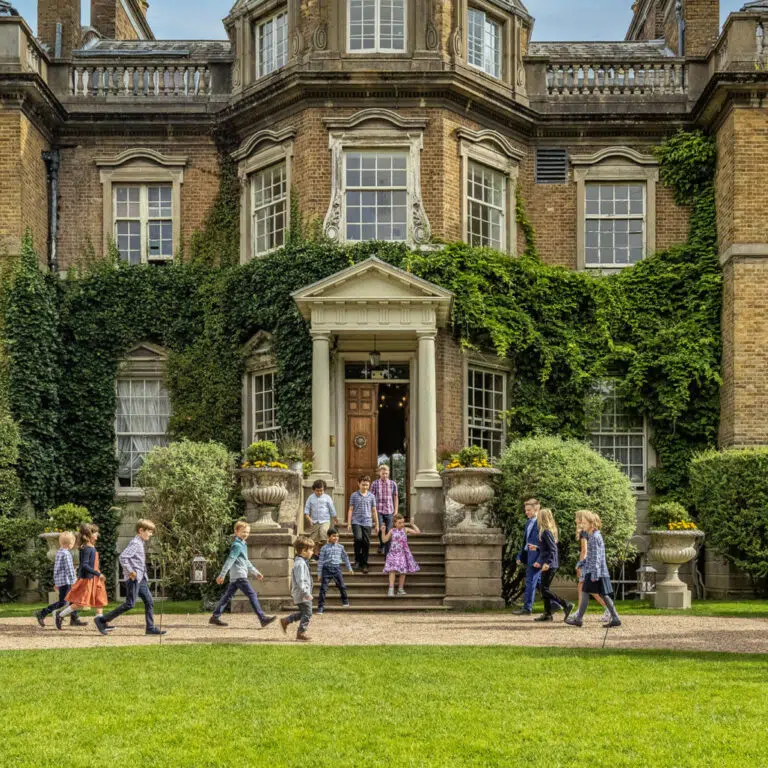Welcome to our French as a Mother Tongue section at Hampton Court House
Hampton Court House is a British school that offers its already French-speaking students the opportunity to follow the same French courses as those taught in a French school: this is the famous acronym FLAM (Français Langue Maternelle), already well known and anchored in the world of French teachers, different from FLE (Français Langue Étrangère). An ideal solution for parents who want their children to follow the English and French curricula simultaneously and to be in close contact with the cultures of both countries.
Hampton Court House places a high value on its students’ progress in French. This is why the emphasis is placed on personalized support for each child. FLAM classes are conducted exclusively in French, in small groups that allow teachers to fully understand each student’s needs and provide support to each student, with one class per day. Children attend these classes during school hours: they leave the rest of the class during French as a Foreign Language (FLE) to join their FLAM teacher.
FLAM follows the French national education curriculum for the subject of French, according to the class and age of the students, from CP to 9th grade. We focus on spelling, conjugation, grammar, in-depth text comprehension, reading, and the study of major literary movements and great authors. Students can also participate in the school’s French-language poetry magazine, Rêveries. As a result, the y benefit from privileged support in their mother tongue.
Hampton Court House aims to enable children to integrate or reintegrate a French-speaking school at a later date, but above all to acquire French perfectly, by being immersed in a language and culture, while following an English-language education. Many of our former FLAM students have, after Hampton Court House, integrated a fully French-speaking curriculum, without ever having any problems. For families wanting even more official certification, we also offer the option of registering your child with the CNED (National Center for Distance Learning) for the subject of French. In this case, the assessments are then corrected by teachers outside the school to attest to the child’s level.
In middle school, taking the FLAM section will allow students to take the French GCSE a year earlier (in Year 10 instead of Year 11). Our goal is for all students from FLAM in Year 11 to also be able to take and obtain the DELF B2, which is a language certification required by all French-speaking universities for students from non-French-speaking courses (British in this case), regardless of the student’s nationalitv.
For any information, contact Aurore Duvollet, FLAM Director, who will be able, during a conversation or a meeting, to present to you the program best suited to your objectives and the needs of your child.
Director of FLAM
What is the difference between FLE and FLAM courses?
First of all, it is considered that in FLAM, students do not face the language barrier and already understand without difficulty the speech of a native French-speaking teacher. Furthermore, students are asked to express themselves only in French during classes, even among themselves, and to be able to read books in French (adapted to the age of course). Without a language barrier, FLAM will allow for much more cultural development through stories, poetry and novel studies, while perfecting expression.
How do I know if my child is comfortable enough to be in FLAM?
If in doubt, the most effective way is simply to try it in FLAM. The teacher, and often the child themselves, will quickly determine whether FLAM courses are suitable, or whether a move to advanced FLE would be a better option. If it doesn’t work in FLAM, you can obviously try again later.
We don't do grammar in FLAM?
Yes, of course, but in a different way. Indeed, in FLE, grammar provides access to language and understanding, whereas in FLAM, grammar is not at the service of understanding but of linguistic improvement. Thus, particularly at the beginning of primary school, the emphasis is placed more on text comprehension and creativity than on grammar. On the other hand, from the middle of primary school, each year we review the basic tenses to consolidate them and introduce new concepts.
Do I need to help my child more if he or she is following FLAM?
Indeed, if at least one of the parents is French-speaking and if possible, being able to help your child with their learning is highly recommended. Generally, this also creates a special moment of French-speaking sharing within the family.
Why can't a child who has taken FLAM also take the French A level a year earlier, just like you do for the GCSE?
We did this before the last curriculum reform, but the new exams require much more specific knowledge that is not possible to fully grasp and understand earlier in schooling, because students are asked to have a certain level of maturity. From now on, students from FLAM must choose “French” as one of their A-level subjects in Year 12 and 13 to be able to continue French, just like FLE students. The French A-level program is fantastic and provides a lot to former FLAM students, because it addresses contemporary themes from the French-speaking world that arenot necessarily covered by the FLAM program.
School Tour
The best way for you and your child to experience Hampton Court House is to visit us. This will also allow us to learn more about your child and your expectations for their education. We strongly encourage children and parents to visit the school together and meet teachers and students.



